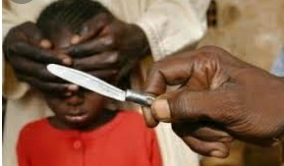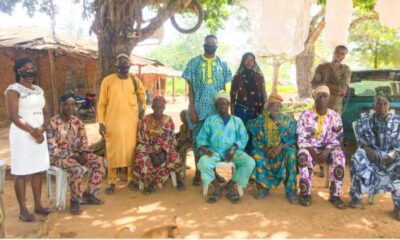News
Female Genital Mutilation:The global Marauding Monster

Female genital mutilation (FGM), also known as female genital cutting and female circumcision, is the ritual cutting or removal of some or all of the external female genitalia. The practice is found in Africa, Asia and the Middle East, and within communities from countries in which FGM is common. UNICEF estimated in 2016 that 200 million women living today in 30 countries—27 African countries, Indonesia, Iraqi Kurdistan and Yemen—have undergone the procedures.
In Nigeria, particularly in thei Southwestern part, the practice is mostly carried out by traditional circumcisers, without proper knowledge of human anatomy and medicine.
Despite the graveness of the issue, the practicing societies look on it as an integral part of their tradition and cultural identity. In the communities that follow excision of female genitalia, FGM/C is associated with ethnicity, culture, prevailing social norms, and sometimes as religious obligations.
In majority of the cases it has been documented that their own family members such as parents mainly mothers, grandparents, and grandmothers of the girls are the perpetrators of this act.
Ensuring daughter’s virginity is a required task for them to arrange for her marriage, receive proper bride price, and for family honor.
There is also a misconception belief that is still present in Nigeria that women believe that female circumcision increases sexual pleasure among men.
Another belief is that FGM/C increases women’s fertility, ability to procreate, and child’s survival. Due to immense social pressure and fear of exclusion from the community, families conform to the tradition.
In Nigeria and other societies, girls who have not gone through FGM/C are considered as unmarriageable, unclean and it is a social taboo.Girls who remain uncut may be teased or looked down upon in the society.
Most times, the girls themselves desire to conform to peer as well as societal pressure out of the fear of stigmatization and rejection by their own community.
They accept the practice as a necessary and normal part of life.
In many communities this particular practice is upheld as a religious requirement. FGM/C is performed by Muslims, Christians.
However, it is carried out in some Muslim communities with the belief that it is demanded by Islamic faith.
In reality, though, there is no documentation of this practice in the holy texts of these religions.
Often older women become the moral gatekeepers in favor of this ritual to justify their own experience of genital cutting and they tend to see any effort to eliminate the practice as a threat to their culture.
Nigeria it faces many problems due to many different resolutions not being in Data shows that the majority of people believe female genital cutting should end, but they cite social pressures to continue the practice with their daughters. Of women aged 15 to 49 polled between 2004–2015, 64% want to end the practice.
Also in Nigeria, the practice is customarily a family tradition that the young female of the age 0-15 would experience. It is a procedure that involves partial or completely removing the external females genitalia or other injury to the female genital organs whenever for non-medical reasons.
The practice is considered harmful to girls and women and a violation of human rights.
FGM causes infertility, maternal death, infections, and the loss of sexual pleasure.
In some Southwestern states in Nigeria, FGM,/C is prevalent in Osun, Ekiti and Ogun states where it is superstitiously believed that once a girl child fails to undergo the FGN, there would calamities like sudden death, ill luck, barrenness and miscarriages among others in the family.
Practising Families and communities go to the extent of using security apparatus to their victims. Sometimes, recalcitrant girll child or children face horrible incidences of kidnapping to ensure the act is performed.
Most times, the blood collected from these young girls is used to appease the gods.
Former Nigerian President, Goodluck Jonathan signed a federal law banning FGM in May 2015, it is however worthy to note that despite efforts by the government to stem the tide by promulgating a federal law to ban FGM/c in Nigeria, Female genital cutting is still widely practiced in prevalent states.
This makes the law signed to have little or no effect on the dangerous practice.
When reports are made to the authorities in charge about the intention of family members to carry out FGM nothing is done to safe the victim.
Activists and scholars say a cultural shift is necessary to abolish the practice, as the new law will not singularly change the wider violence against the girl child and women in Nigeria
-

 News3 days ago
News3 days agoAPC National Chairman: Moves To Oust Ganduje Put Presidency In Quandary
-

 News2 days ago
News2 days agoOsun RAAMP Opens Bid For Road Constructions Statewide
-

 News3 days ago
News3 days agoComrade Joseph Sangosanya dies at 67
-

 News5 days ago
News5 days agoBreaking: JAMB Directs CBT Centres To Arrest Parents Found Near Facilities During UTME Exercise















